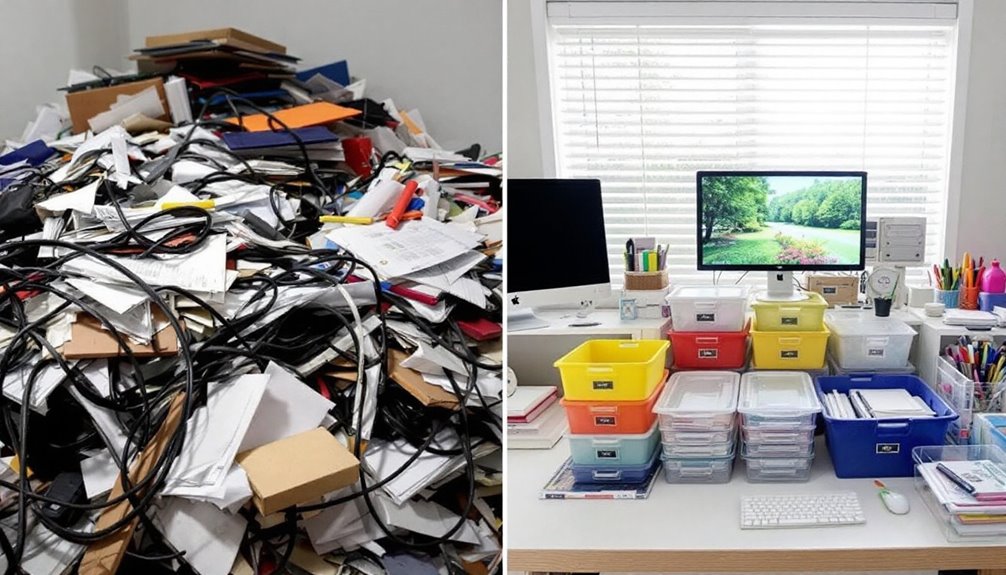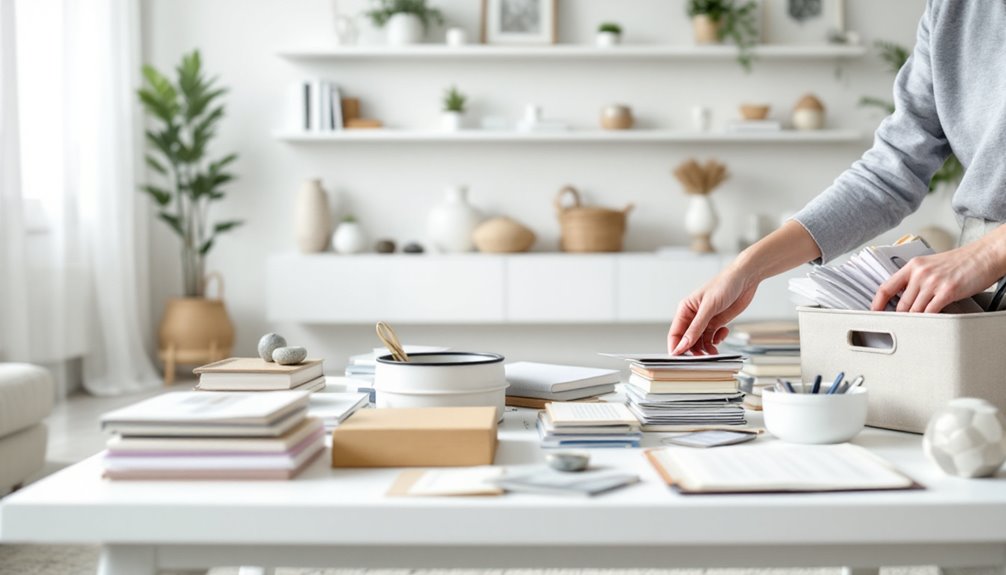Start your decluttering journey by choosing one small, manageable space that impacts your daily life. Gather supplies like trash bags and boxes, then use the Four Box Method to sort items into trash, storage, put away, and give away piles. For bigger decluttering projects you may need to budget for a dumpster. Work zone by zone, applying simple decision rules like the 90/90 rule to evaluate what stays. By breaking down the process into bite-sized tasks, you’ll build momentum toward lasting organization.
Key Takeaways
- Start with a small, manageable space like a drawer or countertop rather than tackling an entire room at once.
- Use the Four Box Method (Trash, Storage, Put Away, Give Away/Sell) to make quick, systematic decisions about items.
- Set a timer for 15-20 minutes of focused decluttering to prevent burnout and maintain momentum.
- Work zone by zone through your space, completing one area fully before moving to the next.
- Create a “Decide Later” box for uncertain items and revisit after 30 days when emotions are less attached.
Set the Stage: Simple Steps to Start Your Decluttering Journey

When starting your decluttering journey, choosing the right area can make the difference between success and frustration. Begin with a small, manageable space like a bathroom or single drawer to build your confidence. You’ll find it’s easier to tackle these contained areas rather than jumping into overwhelming spaces like attics or garages.
Select a high-traffic area that impacts your daily life, such as kitchen countertops or the mudroom. Before diving in, gather your supplies – trash bags, donation boxes, and organizing tools. For larger cleanouts, consider renting a 20 yard dumpster to make waste removal more efficient. Set aside dedicated time for the project and make it enjoyable by playing your favorite music. Remember that decluttering is a gentle ongoing process that requires consistent maintenance over time. If you’re feeling stuck, don’t hesitate to reach out to a professional organizer who can guide you through the process with proven strategies and support.
The Power of Small Wins: Breaking Down the Process
Although decluttering an entire home might seem formidable, breaking the process into smaller, manageable tasks can lead to significant progress. Start by focusing on one small area at a time, like a closet or kitchen counter, where you’ll see immediate results. As you build momentum through these quick wins, you’ll naturally develop routines that transform into lasting habits.
| Area | Quick Win | Long-term Impact |
|---|---|---|
| Closet | Remove 20% unused clothes | Simplified daily choices |
| Kitchen | Clear countertops | Easier cooking & cleaning |
| Papers | Digitize documents | Reduced physical clutter |
| Shelves | Keep only cherished items | Visual spaciousness |
Smart Sorting Strategies That Actually Work

Smart sorting strategies transform the formidable task of decluttering into a manageable process. You’ll find success with the Four Box Method, using clearly labeled containers for Trash, Storage, Put Away, and Give Away/Sell items. This systematic approach helps you make quick decisions as you move through your space.
Working zone by zone prevents overwhelm, so start with less emotional areas like your bathroom before tackling spaces with sentimental attachments. Apply the 90/90 rule to evaluate items: if you haven’t used it in the past 90 days and won’t use it in the next 90, let it go. For items you’re unsure about, create a “Decide Later” box and revisit it after a month. If you haven’t missed these items, you’ll feel confident releasing them from your life.
Making Peace With Letting Go: Practical Decision Rules
Letting go of possessions can stir up complex emotions and hesitation, but practical decision rules make the process clearer and more manageable. You’ll find freedom in following simple guidelines like the 90/90 rule – if you haven’t used an item in the past 90 days and won’t use it in the next 90, it’s time to let go.
| Decision Rule | When to Use |
|---|---|
| 90/90 Rule | Daily-use items |
| One-Year Rule | Clothing and accessories |
| 20/20 Rule | Easily replaceable items |
| Three-Question Test | Sentimental objects |
Creating a Clutter-Free Home That Stays That Way

Creating and maintaining a clutter-free home relies on four key pillars: identifying hotspots, assigning homes for belongings, developing daily habits, and performing regular maintenance.
Start by identifying areas where clutter tends to accumulate, like entryways and kitchen counters. Once you’ve pinpointed these hotspots, create specific solutions, such as adding storage bins or designated spots for frequently used items.
Give every item in your home a proper place, keeping daily essentials accessible and seasonal items stored away.
Develop consistent habits that prevent clutter from returning. Make your bed each morning, sort mail immediately, and clean up after meals. Remember to reset your space daily by returning items to their homes and keeping surfaces clear. You’ll find that maintaining a clutter-free home becomes second nature when you follow these structured approaches.
Frequently Asked Questions
How Do I Declutter When Living With Someone Who Hoards?
Focus on organizing your own space first while respecting their areas. Create boundaries, maintain your clean zones, and don’t criticize their habits. You’ll feel more in control of your environment.
What’s the Best Way to Sell Valuable Items During Decluttering?
Research prices on eBay and Facebook Marketplace, take clear photos, and list your valuables on specialized platforms. You’ll get better prices when you match items to the right selling sites.
How Can I Declutter Digital Files and Emails Effectively?
Start with your emails by unsubscribing from unwanted lists. Then systematically organize your digital files into clear folders, delete duplicates, and use descriptive file names you’ll easily understand later.
Should I Rent a Storage Unit While Decluttering My Home?
You’ll want to avoid renting storage units while decluttering, as they often become expensive clutter graveyards. Instead, focus on making immediate keep-or-discard decisions for lasting organization.
How Do I Handle Guilt When Disposing of Inherited Items?
You’re not dishonoring your loved one by letting go. Remember they wanted you to be happy, not burdened. Take photos, keep select meaningful pieces, and donate items to benefit others.
Conclusion
You’ll find that decluttering isn’t about perfection – it’s about progress. By starting small, celebrating quick wins, and following practical sorting rules, you’ve learned how to make decluttering manageable. Remember, maintaining a clutter-free home is an ongoing practice. Keep using these strategies, trust your decisions, and you’ll create the organized, peaceful space you’ve always wanted.